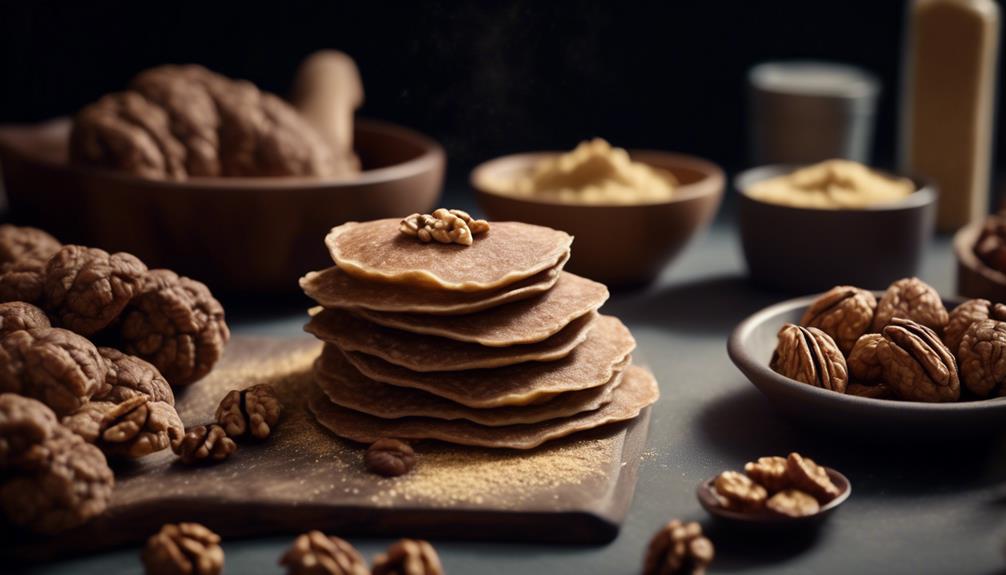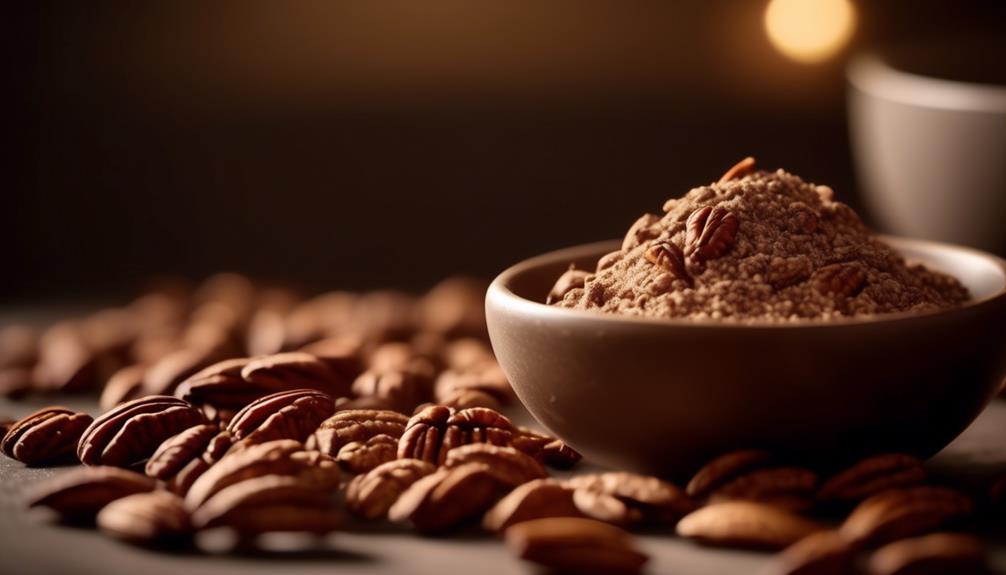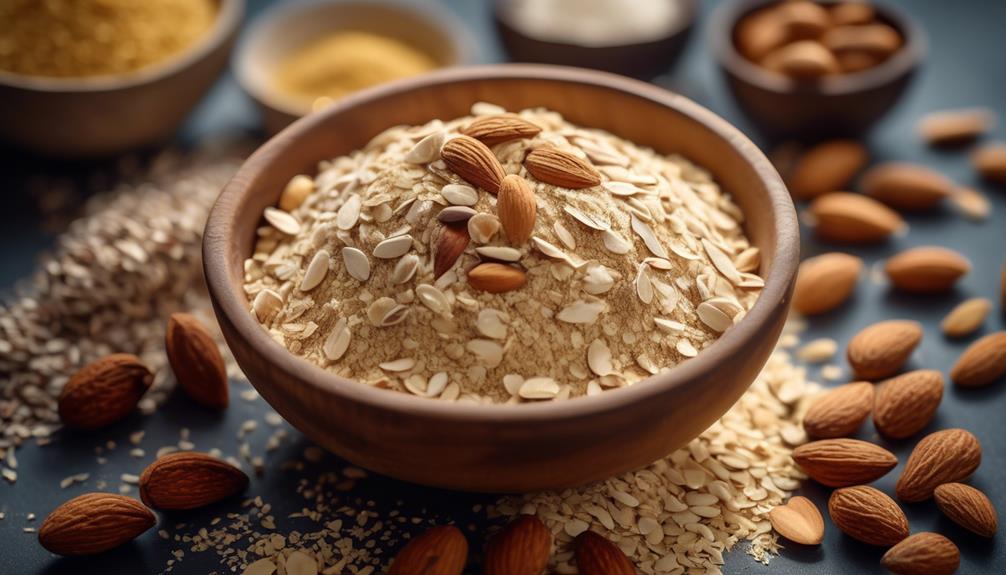Looking to ditch traditional flour in your keto diet? Look no further! There's a whole world of low-carb flour alternatives waiting to be discovered.
Whether you're a seasoned keto enthusiast or just starting out on your low-carb journey, these flour substitutes will make your taste buds sing without sabotaging your goals.
So, grab your apron and prepare to embark on a culinary adventure that will leave you amazed.
But first, let's explore the top low-carb flour alternatives that will revolutionize your keto baking game.
Almond Flour

Almond flour is a popular low-carb alternative used in keto diets. Its versatility and nutritional profile make it a favorite among those following a low-carb lifestyle.
When it comes to cooking techniques, almond flour can be used as a substitute for regular flour in a variety of recipes. It can be used to make breads, muffins, cookies, and even pancakes.
The key to successfully using almond flour is to understand its unique properties. Almond flour is made from ground almonds, which gives it a slightly sweet and nutty flavor. It also has a high fat content, which means it can absorb more liquid than regular flour. This can affect the texture and moisture of baked goods, so it's important to follow recipes specifically designed for almond flour.
When searching for recipes using almond flour, you'll find a wide range of options. From savory dishes like almond-crusted chicken to sweet treats like almond flour chocolate chip cookies, there's something for everyone. Whether you're new to almond flour or a seasoned pro, experimenting with different recipes and cooking techniques will help you discover the full potential of this low-carb ingredient.
Coconut Flour
Coconut flour is a popular low-carb alternative that offers several nutritional benefits. It's high in fiber, protein, and healthy fats, making it a great choice for those following a keto diet.
When using coconut flour in cooking and baking, it's important to note that it absorbs liquid differently than other flours, so recipes may need to be adjusted accordingly.
Compared to other low-carb flours, coconut flour has a unique flavor and texture that can enhance the taste of your dishes.
Nutritional Benefits of Coconut Flour
With its impressive nutritional profile, coconut flour offers a versatile and nutrient-dense alternative for those following a low-carb or keto diet.
Coconut flour is made from the dried and ground meat of coconuts, making it naturally gluten-free and grain-free.
It's rich in dietary fiber, with just two tablespoons providing around 5 grams of fiber. This high fiber content helps to promote healthy digestion, prevent constipation, and support weight management by promoting feelings of fullness.
Additionally, coconut flour is a good source of protein, healthy fats, and several essential vitamins and minerals, including iron, manganese, and potassium. It also contains beneficial antioxidants, which help to protect the body against free radical damage.
Incorporating coconut flour into your diet can be as simple as using it as a substitute in your favorite recipes or exploring new coconut flour recipes for baked goods, pancakes, and even savory dishes.
Cooking and Baking Tips
To enhance your cooking and baking with coconut flour, consider these helpful tips and techniques:
- Adjust the liquid: Coconut flour absorbs a lot of moisture, so it's important to increase the liquid in your recipes. For every 1/4 cup of coconut flour, add an extra egg or 1/4 cup of liquid to maintain the desired consistency.
- Combine with other flours: Coconut flour can be quite dense and dry on its own, so it's often best to combine it with other low-carb flours like almond or flaxseed meal. This will help improve the texture and flavor profile of your baked goods.
- Use smaller quantities: Due to its high fiber content, coconut flour expands when combined with liquid. Therefore, you'll typically need less coconut flour compared to traditional flour in your recipes. Start by using a smaller amount and gradually increase if needed.
Comparison to Other Low-Carb Flours
When comparing low-carb flours, it's important to consider the unique qualities and benefits of coconut flour.
Coconut flour is made from the dried, ground meat of coconuts and is a popular choice for those following a keto diet due to its low carbohydrate content.
One advantage of coconut flour is its ability to absorb liquid, making it ideal for baking and cooking techniques such as thickening sauces and gravies.
Additionally, coconut flour adds a subtle, nutty flavor to dishes, enhancing the overall taste.
It's important to note that coconut flour has a different texture compared to traditional wheat flour, so it may require adjustments in recipes.
Flaxseed Meal
Flaxseed meal offers numerous nutritional benefits that make it a great option for those following a keto diet.
Packed with fiber, healthy fats, and essential nutrients, flaxseed meal can help support digestive health and promote satiety.
Additionally, flaxseed meal can be used as a low-carb binder in cooking and baking, making it a versatile ingredient for keto-friendly recipes.
Nutritional Benefits of Flaxseed
Flaxseed, also known as flaxseed meal, offers a wide array of nutritional benefits that can greatly enhance your keto diet. Here are three reasons why incorporating flaxseed into your diet is a smart choice:
- Rich in Omega-3 Fatty Acids: Flaxseed is one of the best plant-based sources of omega-3 fatty acids, which are essential for brain health and reducing inflammation. Just two tablespoons of flaxseed meal contain about 3.5 grams of omega-3 fatty acids.
- High in Fiber: Flaxseed is packed with dietary fiber, with each serving containing around 4 grams. This high fiber content promotes healthy digestion, helps regulate blood sugar levels, and aids in weight management by promoting feelings of fullness.
- Contains Lignans: Flaxseeds are rich in lignans, which are a type of phytoestrogen that has been linked to a reduced risk of certain cancers, such as breast and prostate cancer. Lignans also have antioxidant properties, helping to protect your cells from damage.
Incorporating flaxseed into your keto diet can provide numerous nutritional benefits, making it a valuable addition to your meal plan.
Cooking and Baking With Flaxseed
To continue reaping the nutritional benefits of flaxseed in your keto diet, you can explore its versatility in cooking and baking. Flaxseed can be used as an egg substitute in recipes, making it a great option for those following a vegan or egg-free diet.
To replace one egg, simply mix one tablespoon of ground flaxseed with three tablespoons of water and let it sit for a few minutes until it becomes gelatinous. This flaxseed 'egg' can then be used in a variety of recipes like pancakes, muffins, and cookies.
Additionally, flaxseed can be added to smoothies for an added boost of fiber and omega-3 fatty acids. Just blend a tablespoon of flaxseed into your favorite smoothie recipe to enjoy the benefits.
Incorporating flaxseed into your cooking and baking is a simple and nutritious way to enhance your keto diet.
Flaxseed as a Keto-Friendly Binder
Using flaxseed meal as a keto-friendly binder in your cooking and baking can provide a nutritious and versatile alternative to traditional binders like flour or eggs.
Flaxseed meal is made by grinding whole flaxseeds into a fine powder, which is rich in omega-3 fatty acids, fiber, and lignans.
Here are three reasons why flaxseed meal is a great option for keto diets:
- Nutritional benefits: Flaxseed meal is a good source of healthy fats and fiber, which can help you feel fuller for longer and support digestion. It also contains lignans, which have antioxidant properties and may have potential health benefits.
- Versatility in recipes: Flaxseed meal can be used as a binder in a variety of keto-friendly recipes, such as bread, muffins, pancakes, and even as a replacement for eggs in vegan recipes. It adds a nutty flavor and a slightly dense texture to baked goods.
- Flaxseed vs. other binders: Compared to traditional binders like flour or eggs, flaxseed meal is lower in carbs and higher in healthy fats. It's also gluten-free, making it suitable for those with gluten sensitivities or following a gluten-free diet.
Incorporating flaxseed meal into your keto cooking and baking can provide not only a delicious flavor but also added nutritional benefits. Try experimenting with flaxseed recipes to discover new ways to enjoy this versatile ingredient.
Chia Seed Flour
Chia seed flour is a versatile and nutrient-rich alternative to traditional flour in low-carb and keto diets. Chia seeds are packed with fiber, healthy fats, and essential minerals, making them an excellent addition to any low-carb recipe. Chia seed flour can be used in a variety of ways to enhance the nutritional profile of your meals.
One popular use for chia seed flour is in baking. It can be substituted for traditional flour in a 1:1 ratio, making it an easy swap for those following a low-carb or keto diet. Chia seed flour adds a subtle nutty flavor and a pleasant texture to baked goods. From bread to muffins, chia seed flour can be used to create delicious and nutritious treats.
Another way to incorporate chia seed flour into your low-carb diet is by using it in chia seed pudding variations. Chia seed pudding is a simple and nutritious dessert that can be customized to suit your taste preferences. By using chia seed flour instead of traditional flour, you can create a thicker and creamier pudding without adding unnecessary carbs.
Psyllium Husk Powder

Psyllium husk powder is a versatile ingredient that can be used as a low-carb alternative in a variety of recipes.
Here are three reasons why you should consider incorporating psyllium husk powder into your keto diet:
- Promotes Digestive Health: Psyllium husk is rich in soluble fiber, which can help regulate bowel movements and promote a healthy digestive system. It acts as a gentle laxative, aiding in the prevention of constipation and promoting regularity.
- Lowers Net Carb Count: Psyllium husk powder is low in carbs and high in fiber. As a result, it can help reduce the net carb count of your recipes, making it a suitable flour substitute for those following a keto diet. It provides a similar texture and structure to traditional flour without the extra carbohydrates.
- Provides a Boost of Fiber: Increasing your fiber intake is essential for maintaining a healthy diet. Psyllium husk powder is an excellent source of dietary fiber, which can help you feel fuller for longer and reduce cravings. By incorporating it into your recipes, you can increase your fiber intake and support your overall health.
Try adding psyllium husk powder to your keto-friendly baked goods, such as bread, muffins, or pancakes. It can also be used as a thickening agent in soups and sauces.
With its numerous benefits and versatility in recipes, psyllium husk powder is a valuable addition to any low-carb kitchen.
Hazelnut Flour
Hazelnut flour is a nutty and versatile ingredient that can be a great addition to your low-carb baking repertoire. It's a low-carb baking staple that's rich in healthy fats, making it a suitable choice for those following a keto diet.
With its unique flavor and texture, hazelnut flour can be used in a variety of recipes, from cookies and cakes to breads and pancakes.
Nutty and Versatile
With its rich and nutty flavor, hazelnut flour offers a versatile and nutritious alternative for those following a low-carb keto diet. Here are three reasons why hazelnut flour is a great choice for your keto-friendly baking needs:
- Low in carbs: Hazelnut flour is a low-carb option that can help you stay within your daily carbohydrate limit while enjoying baked goods. It contains only around 2 grams of net carbs per 1/4 cup, making it a suitable choice for those on a keto diet.
- Nutrient-packed: Hazelnut flour isn't only low in carbs but also packed with essential nutrients. It's a good source of healthy fats, fiber, vitamin E, and minerals such as magnesium and copper. These nutrients can support overall health and well-being.
- Versatile in recipes: Hazelnut flour can be used in various recipes, such as cakes, cookies, and bread. Its nutty flavor adds a delicious twist to your baked goods, enhancing their taste and texture. You can also combine hazelnut flour with other low-carb flours to create a unique blend that suits your preferences.
Incorporating hazelnut flour into your low-carb keto diet can provide you with a tasty and nutritious alternative to traditional flours. Experiment with different recipes and enjoy the nutty goodness hazelnut flour has to offer.
Low-Carb Baking Staple
To continue exploring the benefits of hazelnut flour for low-carb baking, let's now focus on its role as a staple ingredient in keto-friendly recipes.
Hazelnut flour is a versatile option that can be used in a variety of cooking techniques and recipe substitutions. Its unique nutty flavor adds depth to baked goods while keeping them low in carbohydrates.
One of the key advantages of hazelnut flour is its ability to replace traditional flours in a 1:1 ratio, making it easy to adapt your favorite recipes to be keto-friendly. Whether you're making cookies, cakes, or bread, hazelnut flour can provide a delicious and nutritious alternative.
It's also a great source of healthy fats and protein, making it a valuable addition to any low-carb pantry.
Rich in Healthy Fats
Rich in healthy fats, hazelnut flour is a nutritious and versatile ingredient that can enhance the flavor and nutritional profile of your low-carb recipes. Incorporating healthy fats in a keto diet is important as they provide a great source of energy and help promote satiety.
Here are three benefits of incorporating healthy fats in a low-carb diet using hazelnut flour:
- Heart Health: Hazelnut flour contains monounsaturated fats that have been linked to a reduced risk of heart disease. These fats help lower bad cholesterol levels and promote a healthy cardiovascular system.
- Nutrient Absorption: Healthy fats are essential for the absorption of fat-soluble vitamins such as vitamins A, D, E, and K. Adding hazelnut flour to your low-carb recipes can help maximize the absorption of these important nutrients.
- Weight Management: Despite being high in calories, healthy fats can actually aid in weight management. They provide a feeling of fullness, reducing cravings and overeating. Incorporating hazelnut flour into your low-carb diet can help you stay satisfied and maintain a healthy weight.
Sunflower Seed Flour
Sunflower seed flour is a versatile and nutritious alternative to traditional flour in low-carb diets, offering a range of health benefits. This flour is made by grinding sunflower seeds into a fine powder, which can then be used in a variety of recipes. Sunflower seed flour is rich in healthy fats, fiber, and protein, making it a great choice for those following a keto diet.
One of the key nutritional benefits of sunflower seed flour is its high content of healthy fats. These fats are essential for a well-balanced diet and are known to support heart health and brain function. Sunflower seed flour is also a good source of fiber, which helps promote healthy digestion and can aid in weight management.
When it comes to cooking techniques, sunflower seed flour can be used in both sweet and savory recipes. It can be used as a substitute for traditional flour in baking, allowing you to create low-carb versions of your favorite breads, muffins, and cookies. Additionally, sunflower seed flour can be used as a coating for meats and vegetables, providing a crunchy texture and adding a nutty flavor to your dishes.
Walnut Flour

Walnut flour is another low-carb alternative that offers a range of health benefits, making it a great option for those following a keto diet.
Here are three reasons why walnut flour is worth considering as an alternative to traditional flours:
- Low in carbs: Walnut flour is naturally low in carbohydrates, making it an excellent choice for those on a keto diet. It contains only about 2 grams of net carbs per serving, which is significantly lower than wheat flour or other grain-based flours. By using walnut flour in your recipes, you can still enjoy baked goods while keeping your carb intake in check.
- High in healthy fats: Walnuts are known for their high content of healthy fats, including omega-3 fatty acids. These fats are essential for brain health and have been linked to various benefits, such as reducing inflammation and improving heart health. Incorporating walnut flour into your diet allows you to increase your intake of these beneficial fats.
- Rich in nutrients: Walnut flour is also packed with essential nutrients. It's a good source of protein, fiber, magnesium, and antioxidants. Protein is crucial for muscle growth and repair, while fiber supports digestion and helps you feel full. Magnesium plays a vital role in numerous bodily functions, including energy production and bone health. Antioxidants help protect your cells from damage caused by harmful molecules called free radicals.
Sesame Seed Flour
Sesame seed flour is a versatile low-carb alternative that offers a range of health benefits, making it a great option for those following a keto diet. This flour is made from ground sesame seeds and has a rich, nutty flavor that adds depth to a variety of dishes.
Not only is sesame seed flour low in carbohydrates, but it's also packed with essential nutrients. It's a good source of protein, healthy fats, and dietary fiber. Additionally, sesame seeds are rich in vitamins and minerals such as calcium, iron, and magnesium, which are essential for maintaining overall health.
When it comes to incorporating sesame seed flour into your keto diet, the possibilities are endless. You can use it as a substitute for traditional flour in baking recipes to create low-carb bread, muffins, and cookies. It can also be used as a coating for chicken or fish, adding a delightful crunch and flavor. Sesame seed flour can even be sprinkled on top of salads or added to smoothies for an extra boost of nutrition.
To make the most of sesame seed flour in your keto diet, try experimenting with different recipes. Whether you're making bread, cookies, or savory dishes, sesame seed flour can be a great addition to your low-carb cooking repertoire.
Pecan Flour

Pecan flour is a nutritious and flavorful low-carb alternative that can be a valuable addition to a keto diet. Made from ground pecans, this flour isn't only delicious but also packed with essential nutrients. Here are three reasons why pecan flour is a great choice for your cooking needs:
- Versatile Cooking Techniques:
Pecan flour can be used in a variety of cooking techniques. It can be used as a thickener for sauces and gravies, or as a coating for meats and vegetables. You can also use it as a base for low-carb pancakes, muffins, and bread. Its versatility allows you to experiment with different recipes while still maintaining a low-carb lifestyle.
- Nutty Flavor Profile:
Pecan flour has a rich and nutty flavor that adds depth to your dishes. Whether you're making a pecan-crusted chicken or adding it to your favorite keto-friendly desserts, the distinct taste of pecans will enhance the overall flavor profile. It can bring a unique and satisfying element to your meals without compromising your low-carb goals.
- Nutrient-Rich:
Pecan flour isn't only low in carbs but also high in nutrients. Pecans are a good source of healthy fats, fiber, and essential minerals like magnesium and zinc. These nutrients contribute to improved heart health, digestion, and overall well-being. By incorporating pecan flour into your keto diet, you can experience the benefits of both low-carb eating and nutrient-dense ingredients.
Pumpkin Seed Flour
For those following a keto diet, pumpkin seed flour offers a nutritious and low-carb alternative that can be incorporated into a variety of recipes. Pumpkin seed flour is made by grinding raw, shelled pumpkin seeds into a fine powder, which can then be used in baking or cooking. This flour isn't only low in carbohydrates but also packed with health benefits.
One of the main advantages of using pumpkin seed flour is its high nutrient content. It's rich in essential vitamins and minerals such as magnesium, zinc, iron, and potassium. These nutrients are important for maintaining good overall health and supporting various bodily functions.
In addition to its nutrient profile, pumpkin seed flour is also a good source of protein and healthy fats. This makes it an excellent choice for those following a low-carb or ketogenic diet, as it provides a good amount of energy while keeping carbohydrate intake low.
When it comes to cooking techniques, pumpkin seed flour can be used as a replacement for traditional flours in both sweet and savory recipes. It can be used to make bread, pancakes, muffins, cookies, and even pizza crusts. The nutty flavor of pumpkin seed flour adds a unique taste to dishes, making them more enjoyable and satisfying.
Hemp Seed Flour

Hemp seed flour is a nutritious low-carb alternative for those following a keto diet. Packed with essential vitamins, minerals, and healthy fats, it offers a range of health benefits.
Incorporating hemp seed flour into your keto recipes can help add a nutty flavor and boost the nutritional value of your meals.
Nutritional Benefits of Hemp Seed Flour
With its abundance of essential nutrients, hemp seed flour offers a valuable addition to a low-carb diet. Here are three nutritional benefits of incorporating hemp seed flour into your cooking methods:
- High in Protein: Hemp seed flour is rich in protein, making it an excellent choice for those following a low-carb diet. Protein helps promote satiety and supports muscle growth and repair.
- Good Source of Healthy Fats: Hemp seed flour contains a good balance of omega-3 and omega-6 fatty acids. These healthy fats are essential for brain function, reducing inflammation, and supporting heart health.
- Rich in Vitamins and Minerals: Hemp seed flour is packed with vitamins and minerals, including vitamin E, magnesium, zinc, and iron. These nutrients play a crucial role in maintaining overall health and supporting various bodily functions.
Incorporating hemp seed flour into your low-carb cooking can provide you with these health benefits while adding a delicious nutty flavor to your favorite recipes.
How to Use Hemp Seed Flour in Keto Recipes
To incorporate the nutritional benefits of hemp seed flour into your keto recipes, consider using this versatile low-carb ingredient as a substitute for traditional flours.
Hemp seed flour can be used in various cooking techniques to add a nutty flavor and boost the nutritional value of your dishes. When using hemp seed flour in your keto recipes, it's important to keep in mind its distinct taste and texture.
It pairs well with other ingredients such as almond flour, coconut flour, and cocoa powder. This combination not only enhances the flavor but also adds a delightful crunch to your baked goods.
Additionally, hemp seed flour can be used as a thickening agent in sauces, gravies, and soups, providing a creamy texture and a hint of earthiness.
Experimenting with different cooking techniques and flavor pairings will help you unlock the full potential of hemp seed flour in your keto recipes.
Chestnut Flour
Chestnut flour, a versatile and nutritious low-carb alternative, offers a delicious option for those following a keto diet. Here are three reasons why you should consider incorporating chestnut flour into your cooking repertoire:
- Cooking techniques:
Chestnut flour can be used in a variety of cooking techniques, making it a versatile addition to your kitchen. You can use it as a substitute for regular flour in baking recipes, such as cakes, cookies, and bread. Additionally, it can be used as a thickening agent in sauces, soups, and stews. Its unique texture and flavor make it a great choice for experimenting with new recipes.
- Taste comparisons:
Chestnut flour has a slightly sweet and nutty flavor that adds depth to your dishes. Compared to other low-carb flours, such as almond or coconut flour, chestnut flour has a milder taste that doesn't overpower the other ingredients. It pairs well with both sweet and savory dishes, allowing you to create a wide range of flavorful meals.
- Nutritional benefits:
Chestnut flour isn't only low in carbs but also rich in nutrients. It contains vitamins B and C, as well as minerals like potassium and magnesium. Additionally, it's high in fiber, which helps promote digestive health and keeps you feeling full for longer. Incorporating chestnut flour into your keto diet can help ensure you're getting the nutrients you need while enjoying delicious meals.
Tiger Nut Flour

One alternative to chestnut flour for those following a keto diet is tiger nut flour, which offers its own unique set of benefits and flavors. Tiger nut flour is made from the tuberous root of the tiger nut plant, which is native to Africa. Despite its name, tiger nuts aren't nuts but rather small root vegetables.
Tiger nut flour is an excellent choice for those on a keto diet due to its low carbohydrate content. It's rich in fiber, which helps to regulate blood sugar levels and promote healthy digestion. Additionally, tiger nut flour is gluten-free, making it suitable for individuals with gluten sensitivities or celiac disease.
When using tiger nut flour in your cooking, it's important to note that it has a slightly sweet and nutty flavor. This makes it a great addition to baked goods such as cookies, muffins, and bread. It can also be used as a thickening agent in sauces and soups.
In terms of storage, tiger nut flour should be stored in an airtight container in a cool, dry place. This will help to preserve its freshness and prevent it from absorbing any unwanted odors or moisture. With proper storage and cooking techniques, tiger nut flour can be a delicious and nutritious addition to your keto diet.
Conclusion
In conclusion, when it comes to low-carb flour alternatives for keto diets, there are plenty of options to choose from.
Whether you prefer the nutty taste of almond flour, the light and fluffy texture of coconut flour, or the nutritional benefits of flaxseed meal, there's a flour alternative that will suit your needs.
So, go ahead and explore these options to add variety and flavor to your keto recipes while staying true to your dietary goals.







